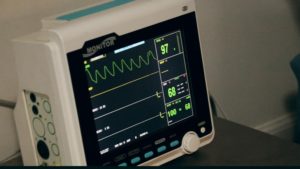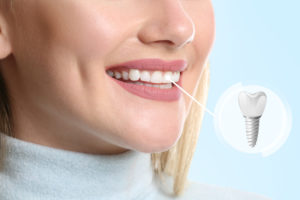IT’S A CHOICE – PART 2
May 31, 2022
 Last week I introduced a couple who had been seeing the same dentist for 30 years and were finally forced to make a change due to the dentist’s retirement. They visited a “new” dentist and were turned off because the dentist recommended significant treatment. Then they consulted with another dentist, who spent more time with them to discuss their specific situations and goals. However, they still missed their “old” dentist.
Last week I introduced a couple who had been seeing the same dentist for 30 years and were finally forced to make a change due to the dentist’s retirement. They visited a “new” dentist and were turned off because the dentist recommended significant treatment. Then they consulted with another dentist, who spent more time with them to discuss their specific situations and goals. However, they still missed their “old” dentist.
The couple loved their “old” dentist because she was someone they could relate to. The dentist kept things simple, and they liked simple. If they had a broken tooth, the dentist patched it up and they were on their way. They never talked about the future. They may have lost some teeth over the years, but the dentist never discussed “needing” a lot of dental work.
The first “new” dentist was a nice person. In fact, they knew the dentist outside the office before they became patients. The problem was poor communication and inability to relate to the patient’s specific needs. This dentist looked in both their mouths and said they each “needed’ 8 crowns. It didn’t make sense to them. It seemed too complicated, expensive and unnecessary.
The second “new” dentist took a different approach and spent time with the couple discussing their current situation and future objectives. They both wanted to keep their teeth but still had trouble coming to grips with the fact that they “needed” significant dental work to accomplish their objective. Why couldn’t they continue on the same simple path they had with their original dentist?
Dentists are sometimes more interested in what they are saying than patients are. It is important to remember that the teeth are attached to a person; and that person has their own story that goes along with their teeth.
People put different values on different things. Whether we sell cars, trips, hairstyles or teeth, the objective of the “seller” is to make the prospective “buyer” aware of what they have and all the possibilities that are available to them. It is always the consumer’s decision. While there is a health component to dentistry, you can compare any other aspect of selling the other commodity examples to teeth. Things that come to mind: comfort, looks, self-esteem, and functioning in life.
To “buy” anything, people have to be ready. What makes someone ready? They are ready when they feel the need to act. In the absence of readiness, over-education by the “seller” often feels like sales pressure to the buyer. I’m sure you have experienced this if you have ever been to a car dealership.
I love analogies. I especially love car analogies as they relate to dentistry. Cars are easy because most of us rely on them every day, just like our teeth. Some of us like simple cars, while others like fancier cars. Some take better care of their cars and they last longer. Others abuse their cars and they need more repairs. One thing is certain; maintenance is the key to long-term success of the car.
Raising awareness is a difficult task for anyone promoting their product or service. Acting on something is only accomplished when value is realized. Some end up seeing the value in their life and others do not.
Dr. St. Clair maintains a private dental practice in Rowley and Newburyport dedicated to health-centered family dentistry. He has a special interest in treating snoring, sleep apnea and TMJ problems. If there are certain topics you would like to see written about or questions you have, please email them to him at jpstclair@stclairdmd.com
IT’S A CHOICE – PART 1
May 23, 2022
 People often ask me how I have time to write columns, and how I’ve come up with topics for as long as The Town Common has been around. If you have read my columns over the years, you’ll remember I have discussed that time was one of the barriers keeping people from getting the dental care they need. Time is an excuse and I use it as an excuse all the time. However, we always make time for things that are important to us.
People often ask me how I have time to write columns, and how I’ve come up with topics for as long as The Town Common has been around. If you have read my columns over the years, you’ll remember I have discussed that time was one of the barriers keeping people from getting the dental care they need. Time is an excuse and I use it as an excuse all the time. However, we always make time for things that are important to us.
The topics I come up with have been an evolution. I try to keep it interesting. Of course, many of the things that I find interesting in dentistry would bore others. While some of my columns may bore you to tears, hopefully there are others that you can relate to, or stimulate thoughts or questions.
Let’s talk today about a common scenario seen in all dental offices. New patients, husband and wife in their 60’s, are “forced” to make a dental provider change. I say “forced” because regardless of our situation, we always have a choice in our providers.
This couple had been seeing the same dentist for 30 years. Despite the fact that they moved 20 miles from the dentist 10 years ago, they continued to make the drive to the office. They were dedicated and they loved their dentist. Then one day the dentist retired and they decided it was time to choose someone closer to where they lived.
Both went to their new office for hygiene appointments and then discussed their experience. They both felt the office staff was less friendly than their previous office. Of course, they knew that “old” office and loved everyone there. They were still willing to give it a chance, until they met the dentist. The dentist seemed like a nice person but took a quick look and said the same thing to both husband and wife – You NEED 8 crowns.
How could this be, they thought? They had been going to the same office for 30 years, neither ever had a crown, and when something broke, their favorite dentist would “patch” them up. They were completely turned off. They were “forced” again to make a change.
This time they wanted to meet the dentist first and see what the dentist had to say before they committed. They set up a 30-minute appointment. At that appointment, the “new” dentist examined their x-rays and took photographs of their teeth. They had an in-depth conversation about the condition of their dental health. They were asked what their short-term and long-term objectives were. The word “crown” was never mentioned…..until one of them asked the dentist.
The dentist discussed advantages and disadvantages of different kinds of treatment. Since the patient’s long-term objective was to have teeth forever, they discussed options for treatment, prioritization and sequencing, as well as financial options. Although they were not ready to dive into treatment, they left the office with a much better understanding of where they stood and appreciated the time that was taken to explain their specific situations.
Every person, every patient, every dentist, is different. This couple experienced three different practice styles. They could relate to Dentist #1 – their “old” dentist. Dentist #2 lacked communication skills, therefore the relationship failed. Dentist #3 took the time to learn about their specific needs and goals. They didn’t feel sales pressure but are still overwhelmed by their apparent “needs.”
To be continued……
Dr. St. Clair maintains a private dental practice in Rowley and Newburyport dedicated to health-centered family dentistry. He has a special interest in treating snoring, sleep apnea and TMJ problems. If there are certain topics you would like to see written about or questions you have, please email them to him at jpstclair@stclairdmd.com
INFORMATION FOR CARDIAC PATIENTS
May 16, 2022
 It is common sense that infected teeth, whether they hurt or not, or are broken down beyond repair, should be removed. We also all know by now that there are mouth-body connections and that the mouth is the “gateway” to the rest of the body. There is no disputing that a healthy mouth is better for you on many levels. However, in a recently released study, the guidelines for treatment of some types of dental problems prior to specific surgery need closer consideration.
It is common sense that infected teeth, whether they hurt or not, or are broken down beyond repair, should be removed. We also all know by now that there are mouth-body connections and that the mouth is the “gateway” to the rest of the body. There is no disputing that a healthy mouth is better for you on many levels. However, in a recently released study, the guidelines for treatment of some types of dental problems prior to specific surgery need closer consideration.
According to a study in an issue of The Annals of Thoracic Surgery, removing an infected tooth prior to cardiac surgery may increase the risk of major adverse outcomes, including risk of death prior to surgery. This is a very specific study for a very specific group of patients. It does suggest considering postponing dental problems prior to any surgery.
Dental extraction of abscessed or infected teeth is often performed to decrease the risk of infection during surgery and endocarditis (an inflammation of the inner layer of the heart) following surgery. In this particular study, physician researchers evaluated the occurrence of major adverse outcomes in 205 patients who underwent at least one dental extraction prior to planned cardiac surgery. The median time from dental extraction to cardiac surgery was 7 days (average 35 days).
One of the researchers explained, “Guidelines from the American College of Cardiology and American Heart Association label dental extraction as a minor procedure, with the risk of death or non-fatal heart attack estimated to be less than 1%. Our results, however, documented a higher rate of major adverse outcomes, suggesting physicians should evaluate individualized risk of anesthesia and surgery in this patient population.”
In this study, patients who underwent dental extraction prior to cardiac surgery experienced an 8% incidence of major adverse outcomes, including new heart attack, stroke, kidney failure and death. Overall, 3% of patients died after dental extraction and before the planned cardiac surgery could be performed. Another of the researchers went on to say, “With the information from our study we cannot make a definitive recommendation for or against dental extraction prior to cardiac surgery. We recommend an individualized analysis of the expected benefit of dental extraction prior to surgery weighed against the risk of morbidity and mortality as observed in our study.”
This study, as in many “new” studies, awakens us to consider a departure from current lines of thinking about specific situations. This paradigm shift of thinking has also been noted in the use of prophylactic antibiotics prior to dental procedures in those with cardiac conditions.
Prophylactic antibiotics have routinely been prescribed for patients undergoing dental work who also had existing heart problems because it had been accepted that there is a link between dental bacteremia and endocarditis. Individuals with pre-existing heart problems tend to have a higher incidence of endocarditis. The American Heart Association and others have withdrawn support for this practice of prophylactic antibiotics because the danger from overuse of antibiotics outweighs any other potential risks. Regular tooth brushing, flossing, and even chewing gum are now recognized to dislodge as much, if not more, bacteremia than most dental procedures.
Prevention of dental problems is the best line of defense. Regular professional maintenance, especially as we age, is important to our overall health. Talk with your dentist and physician about your specific situations.
Dr. St. Clair maintains a private dental practice in Rowley and Newburyport dedicated to health-centered family dentistry. He has a special interest in treating snoring, sleep apnea and TMJ problems. If there are certain topics you would like to see written about or questions you have, please email them to him at jpstclair@stclairdmd.com
COMMUNICATION IS KEY
May 9, 2022
 It is not uncommon to get a second opinion, or a second or third quote for things like car repairs and home improvements. When it comes to our health, it usually depends on the nature of the issue. More complex issues in medicine, such as a diagnosis of cancer, an unknown diagnosis, or other major medical issues in which we have to make decisions about significant treatment, tend to stimulate people to get more than one opinion. In dentistry, it seems that the incidence of second opinions is not as great.
It is not uncommon to get a second opinion, or a second or third quote for things like car repairs and home improvements. When it comes to our health, it usually depends on the nature of the issue. More complex issues in medicine, such as a diagnosis of cancer, an unknown diagnosis, or other major medical issues in which we have to make decisions about significant treatment, tend to stimulate people to get more than one opinion. In dentistry, it seems that the incidence of second opinions is not as great.
Routine dental care is generally not that complicated. There are many different ways to do the simplest things in dentistry. The method is a function of the dentist’s beliefs and training. It is relatively uncommon for a patient to get a second opinion for this type of maintenance dental care. Although there is some subjectivity as to what different dentists might deem as “needing” to be done, patients usually base their decision on their perceived need. This perception of need comes from the dentist’s ability to communicate the reasons for treatment.
The patient’s trust in their provider is a big factor. If a patient trusts and genuinely likes their dentist, they may not necessarily do or want to do what the dentist wants them to, but they are comfortable enough to make the decision on treatment. It is when there is a lack of trust, for one reason or another, that patients tend to venture out for another opinion. This lack of trust usually stems from a personality conflict or the inability of the dentist to properly communicate with the patient effectively.
Even when there are more complex dental issues, it is my feeling that patients base the need for another opinion on lack of trust. Another important factor is that the patient is given choices. Patients always have the right to choose what treatment they feel is right for themselves. If choices are given and the treatment is properly communicated to the patient, they have the ability to decide in what direction to proceed.
If a dentist properly communicates the need for treatment and the patient decides to do nothing, it is the patient’s choice. It is when treatment is properly presented and it aligns with the patient’s perception of need or desire, that the patient moves forward with treatment.
Fees tend to be a less common reason for patients to seek another opinion. Fees for treatment can definitely vary. The problem with seeking treatment based on fees is that the same treatment in two different offices with different fees can also vary in the level of expertise and precision in which it is done. There are many factors.
A higher fee does not always mean a higher quality product. Fees are generally based on the time involved, the materials used, and the perceived expertise of the provider. Be cautious when seeking treatment based on fees. The fee for treatment should definitely be considered, but the entire treatment presentation and the way in which it is communicated should be used to determine your decision.
Dr. St. Clair maintains a private dental practice in Rowley and Newburyport dedicated to health-centered family dentistry. He has a special interest in treating snoring, sleep apnea and TMJ problems. If there are certain topics you would like to see written about or questions you have, please email them to him at jpstclair@stclairdmd.com
5 Cool Things About Dental Implants
May 6, 2022

You might think that dental implants aren’t that noteworthy a treatment. They just replace natural teeth with artificial ones, right? That doesn’t seem like too big a deal. After all, dentures and dental bridges can do that too.
On the contrary, though, implants have great features that help set them apart. Look at these five facts to see for yourself! (more…)
PROTECT YOUR TEETH!
May 2, 2022
 This past weekend, my brother sent me a text with a picture of my 15-year-old nephew all bloodied-up with broken upper and lower teeth. He is a mountain bike daredevil…..and the mountain won the battle. Protection of for the teeth is not just for certain sports.
This past weekend, my brother sent me a text with a picture of my 15-year-old nephew all bloodied-up with broken upper and lower teeth. He is a mountain bike daredevil…..and the mountain won the battle. Protection of for the teeth is not just for certain sports.
Mouthguards are nothing new, but there are still far too many sports related injuries. Although most youth sport organizations have cracked down on making kids wear mouth protection, there are still injuries occurring. Taking the appropriate protective measures while on the court, field, rink, or ring can save mouths from serious injury and costly dental repairs.
Any sport that presents the chance of contact or collision with another person, object, or surface can potentially cause injury to teeth, jaws, and oral soft tissue. These sports include, but are not limited to, football, basketball, soccer, hockey, boxing, and lacrosse. Individuals who participate in sports, such as biking, inline skating, or skateboarding are also at risk for injury.
Teeth get in the way. Other than your nose, front teeth are “out there” and your lips only provide minimal protection. For example, a student I saw this past spring was injured playing squash at a local private school. Squash is a non-contact sport, but the game is played in close proximity to another player with a swinging racquet. The student I treated had been hit in the mouth with the other player’s racquet. He required a root canal on one front tooth with a crown. The other front tooth needed to be extracted and replaced with a dental implant. All of this could have been prevented or at least damage lessened with the use of a mouthguard.
For some reason, baseball is one of those sports where kids do not wear protective mouthguards. No matter what age level, a player can misjudge a ball or a ball can take an unexpected bounce, causing serious injury.
In lacrosse, both boys and girls should always be wearing mouth protection. That ball is extremely hard and heavy. Boys are better protected than girls because they at least wear helmets; both should be wearing helmets, in my opinion.
A custom mouthguard made by your dentist covers the upper teeth with a soft, flexible material that prevents serious injuries such as broken teeth, jaw fractures, cerebral hemorrhage, and neck injuries. It decreases the chance of the lower jaw jamming into the upper jaw or being pushed back into the temporomandibular joint (TMJ). Mouthguards may reduce the severity and incidence of concussions as well.
Custom mouthguards, made by a dentist, fit 100 times better than anything you can buy in a store. This not only improves performance (making it easier to breathe), but also makes it more likely the athlete will keep the mouthguard in. They may cost more than the boil/bite generic ones, but they are better, and that is enough reason to consider them.
If you seek treatment immediately after the injury occurs, your dentist often can save knocked-out teeth and repair minor chips and cracks with appropriate dental materials. See your dentist for evaluation if your tooth changes color, if you experience any pain, or if you notice any swelling in or around your mouth following trauma.
Even if it isn’t “cool” to wear a mouthguard in the sport you are playing, I strongly recommend it. You only get one set of your own teeth.
Dr. St. Clair maintains a private dental practice in Rowley and Newburyport dedicated to health-centered family dentistry. He has a special interest in treating snoring, sleep apnea and TMJ problems. If there are certain topics you would like to see written about or questions you have, please email them to him at jpstclair@stclairdmd.com







